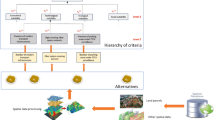Abstract
The aggregation of multi-source information can be realized by means of the ordered representation of polygonal fuzzy sets and their linear operations, especially the ordered representation plays an important role in multi-attribute decision analysis. An intuitionistic fuzzy set is not only a generalization of traditional fuzzy set, but also can overcome some defects of fuzzy phenomena described by binary logic. In this paper, we first propose the ordered representation and its arithmetic operations of n-intuitionistic polygonal fuzzy sets (n-IPFS) based on the idea of equidistant dissection, and give a method to solve the ordered representation of n-IPFS through an example. Secondly, a mathematical linear function describing multi-source information of modern smart city is given through an ordered representation of n-IPFS, a new normalization method and calculation formula are proposed for the intuitionistic polygonal decision matrix. Then, by using n-IPFS arithmetic operations the aggregation method of weighted average operator and geometric average operator of multi-source information is given. Finally, the effectiveness of the proposed method is verified by aggregating multi-source information, and thus an intuitionistic fuzzy set and polygonal fuzzy set are unified and applied to decision-making problem of multi-source information of modern smart cities.






Similar content being viewed by others
References
Atanassov, K.T.: Intuitionistic fuzzy sets. Fuzzy Sets Syst. 20(1), 87–96 (1986)
Szmidt, E., Kacprzyk, J.: Distances between intuitionistic fuzzy sets. Fuzzy Sets Syst. 114(3), 505–518 (2000)
Xu, Z.S., Yager, R.R.: Some geometric aggregation operator based on intuitionistic fuzzy sets. Int. J. Gen. Syst. 35(4), 417–433 (2006a)
Yager, R.R.: Some aspects of intuitionistic fuzzy sets. Fuzzy Optim. Decis. Making 8(1), 67–90 (2009)
Wang, J.Q.: Multi-criteria interval intuitionistic fuzzy decision making approach with incomplete certain information. Control Decis. 21(11), 1253–1256 (2006)
Wan, S.P., Dong, J.Y.: Method of intuitionistic trapezoidal fuzzy number for multi-attribute group decision. Control Decis. 25(5), 773–776 (2010)
Torra, V.: Hesitant fuzzy sets. Int. J. Intell. Syst. 25(6), 529–539 (2010)
Xu, Z.S., Xia, M.: Distance and similarity measures for hesitant fuzzy sets. Inf. Sci. 181(11), 2128–2138 (2011)
Yager, R.R.: Pythagorean membership grades in multicriteria decision making. IEEE Trans. Fuzzy Syst. 22(4), 958–965 (2014)
Hwang, C.L., Yoon, K.: Multiple Attribute Decision Making Methods and Applications. Springer, Berlin (1991)
Xu, Z.S., Yager, R.R.: Some geometric aggregation operators based on intuitionistic fuzzy sets. Int. J. Gen. Syst. 35(4), 417–433 (2006b)
Xu, Z.S.: Models for multiple attribute decision making with intuitionistic fuzzy information. Int. J. Uncertain. Fuzziness Knowl. Based Syst. 15(3), 285–297 (2007a)
Xu, S.Z.: Multi-person multi-attribute decision making models under intuitionistic fuzzy environment. Fuzzy Opim. Decis. Making 6(3), 221–236 (2007b)
Wei, G.W.: Some geometric aggregation functions and their application to dynamic multiple attribute decision making in the intuitionistic fuzzy setting. Int. J. Uncertain. Fuzziness Knowl. Based Syst. 17(2), 179–196 (2009)
Wei, G.W.: Some arithmetic aggregation operators with intuitionistic trapezoidal fuzzy numbers and their application to group decision making. J. Comput. 5(3), 345–351 (2010)
Wan, S.P.: Multi-attribute decision making method based on interval-valued intuitionistic trapezoidal fuzzy number. Control Decis. 26(6), 857–860 (2011)
Wan, S.P., Wang, F., et al.: An intuitionistic fuzzy programming method for group decision making with interval-valued fuzzy preference relations. Fuzzy Optim. Decis. Making 16(3), 269–295 (2017)
Wang, J.Q., Nie, R.R.: Multi-criteria group decision-making method based on intuitionistic trapezoid fuzzy information. Syst. Eng. Theory Pract. 32(8), 1747–1753 (2012)
Wu, P., Zhou, L.G., Zheng, T., et al.: A fuzzy group decision making and its application based on compatibility with multiplicative trapezoidal fuzzy preference relations. Int. J. Fuzzy Syst. 19(3), 683–701 (2017)
Rahman, K., Abdullah, S., Jamil, M., et al.: Some generalized intuitionistic fuzzy Einstein hybrid aggregation operators and their application to multiple attribute group decision making. Int. J. Fuzzy Syst. 20(5), 1567–1575 (2018)
Liu, P.Y.: A new fuzzy neural network and its approximation capability. Sci. China E 32(1), 76–86 (2002)
Wang, G.J., Li, X.P.: Universal approximation of polygonal fuzzy neural networks in sense of K-integral norms. Sci. China 54(11), 2307–2323 (2011)
Wang, G.J., He, Y., Li, X.P.: Optimization algorithms for MISO polygonal fuzzy neural networks. Sci. China 45(5), 650–667 (2015)
Wang, G.J., Suo, C.F.: The isolation layered optimization algorithm of MIMO polygonal fuzzy neural network. Neural Comput. Appl. 29(10), 721–731 (2018)
Duan, Y., Wang, G.J.: A FCM clustering algorithm based on polygonal fuzzy numbers to describe multiple attribute index information. Syst. Eng.-Theory Pract. 36(12), 3220–3228 (2016)
Wang, G.J., Duan, Y.: TOPSIS approach for multi-attribute decision making problems based on n-intuitionistic polygonal fuzzy sets description. Comput. Ind. Eng. 124(10), 573–581 (2018)
Liu, C., Tang, G.L., Liu, P.D.: Hesitant fuzzy linguistic archimedean aggregation operators in decision making with the dempster–shafer belief structure. Int. J. Fuzzy Syst. 21(5), 1330–1348 (2019)
Tang, J., Meng, F.Y., Cabrerizo, F.J.: A procedure for group decision making with interval-valued intuitionistic linguistic fuzzy preference relations. Fuzzy Optim. Decis. Making 18(4), 493–527 (2019)
Wang, G.J., Tao, Y.J., Li, Y.H.: TOPSIS evaluation system of logistics transportation based on an ordered representation of the polygonal fuzzy set. Int. J. Fuzzy Syst. 22(5), 1565–1581 (2020)
Wang, G.J.: Polygonal Fuzzy Neural Network and Fuzzy System Approximation. Science Press, Beijing (2017)
Funding
This work has been supported by the National Natural Science Foundation of China (Grant No. 61374009).
Author information
Authors and Affiliations
Corresponding author
Rights and permissions
About this article
Cite this article
Li, X., Li, Y. & Tao, Y. Representation and Aggregation of Multi-source Information of Modern Smart Cities Based on the Intuitionistic Polygonal Fuzzy Set. Int. J. Fuzzy Syst. 23, 967–983 (2021). https://doi.org/10.1007/s40815-020-01001-w
Received:
Revised:
Accepted:
Published:
Issue Date:
DOI: https://doi.org/10.1007/s40815-020-01001-w




